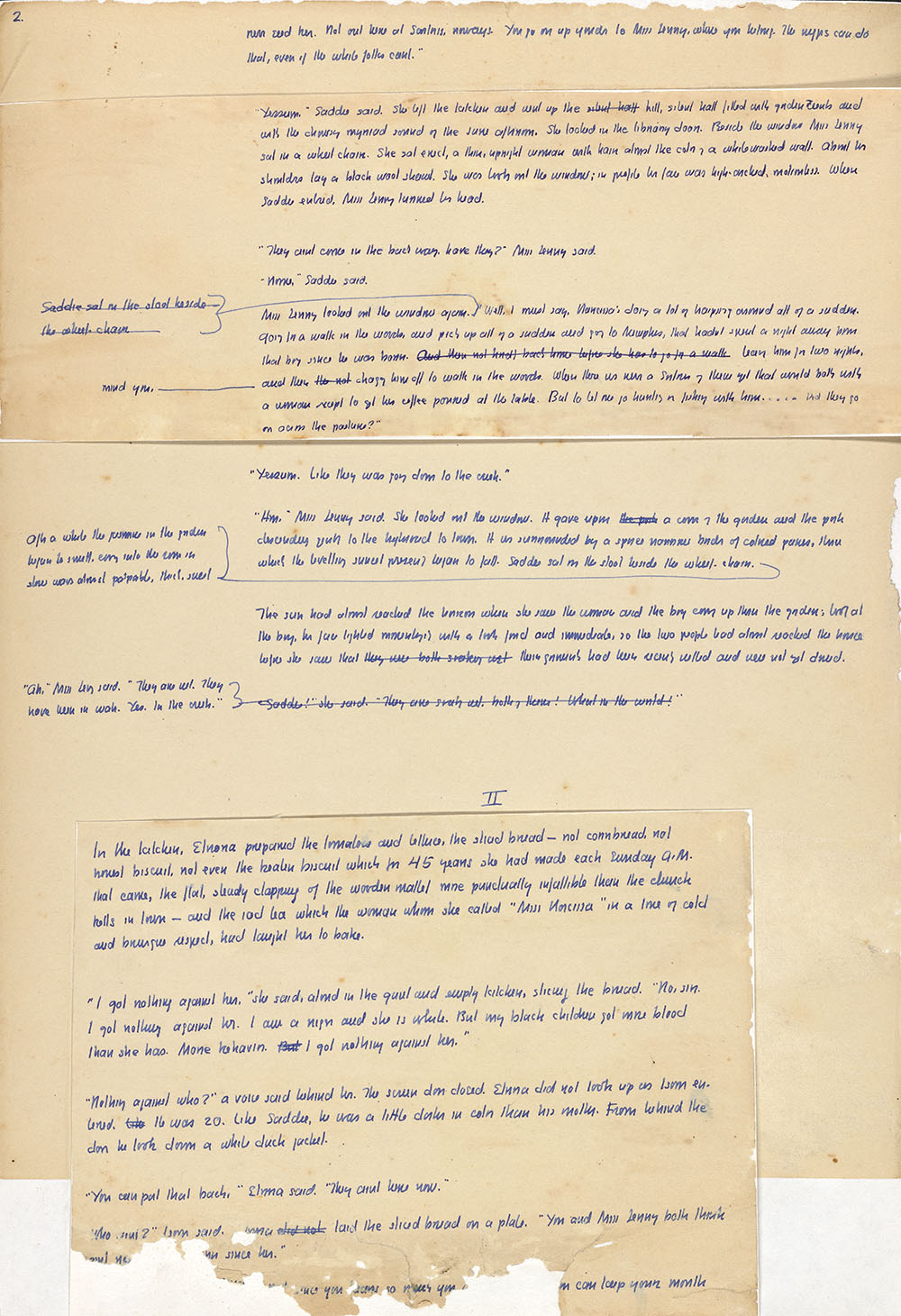TRANSCRIPTION
never seed her. Not out here at Sartoris, noways. You go on up yonder to Miss Jenny, where you belong. The niggers can do
that, even if the white folks cant."
"Yessum," Saddie said. She left the kitchen and went up the <silent hall> hall, silent hall filled garden scents and
with the drowsy myriad sound of the June afternoon. She looked in the library door. Beside the window Miss Jenny
sat in a wheel chair. She sat erect, a thin, upright woman with hair almost the color of a whitewashed wall. About her
shoulders lay a black wool shawl. She was looking out the window; in profile her face was high-arched, motionless. When
Saddie entered, Miss Jenny turned her head.
"They aint come in the back way, have they?" Miss Jenny said.
"Nome," Saddie said.
Miss Jenny looked out the window again.
[margin: Saddie sat on the stool beside the wheel-chair]
"Well, I must say, Narcissa's doing a lot of traipsing around all of a sudden.
going for a walk in the woods, and picking up all of a sudden and going to Memphis, that hadn't spent a night away from
that boy since he was born. <And then not hardly back home before she has to go for a walk> leave him for two nights,
[margin: mind you,]
and then <the not?> dragging him off to walk in the wood. When there was never a Sartoris of them yet that would walk with
a woman except to get her coffee poured at the table. But to let one go hunting or fishing with him . . . . . Did they go
on across the pasture?"
"Yessum. Like they was going down to the creek."
"Hm," Miss Jenny said. She looked out the window. It gave upon <the park?> a corner of the garden and the park
descending gently to the highroad to town. It was surrounded by a [illegible] narrow border of colored panes, thru
which the levelling sunset presently began to fall. Saddie sat on the stool beside the wheel-chair.
[margin: After a while the jasmine in the garden began to smell, coming into the room in slow waves almost palpable,
thick, sweet]
The sun had almost reached the horizon when she saw the woman and the boy come up thru the garden; looking at
the boy, her face lighted momentarily with a look fond and immediate, so the two people had almost reached the house
before she saw that <they were both soaking wet> their garments had been recently wetted and were not dried.
"Saddie!" she said. "They are soaking wet, both of them! What in the world?"
[margin: "Ah," Miss Jenny said. "They are wet. They have been in the water. Yes. In the creek."]
II
In the kitchen, Elnora prepared the tomatoes and lettuce, the sliced bread – not cornbread, not
honest biscuit, not even the beaten biscuit which for 45 years she had made each Sunday A.M.
that came, the flat, steady clapping of the wooden mallet more punctually infallible than the church
bells in town – and the ice tea which the woman whom she called "Miss Narcissa" in a tone of cold
and [brusque?] respect, had taught her to bake.
"I got nothing against her," she said, aloud in the quiet and empty kitchen, slicing the
ead. "No, sir.
I got nothing against her. I am a nigger and she is white. But my black children got more blood
than she has. More behavior. <But> I got nothing against her."
"Nothing against who?" a voice said behind her. The screen closed. Elnora did not look up as Isom en-
tered. <Like> He was 20. Like Saddie, he was a little darker in color than his mother. From behind the
door he took down a white duck jacket.
"You can put that back," Elnora said. "They aint home now."
"Who aint?" Isom said. Elnora <did not> laid the sliced bread on a plate. "You and Miss Jenny both think
[the rest of this page is torn; in the last two lines the following words can be made out:]
since her
since you . . . so much you . . . can keep your mouth
|


